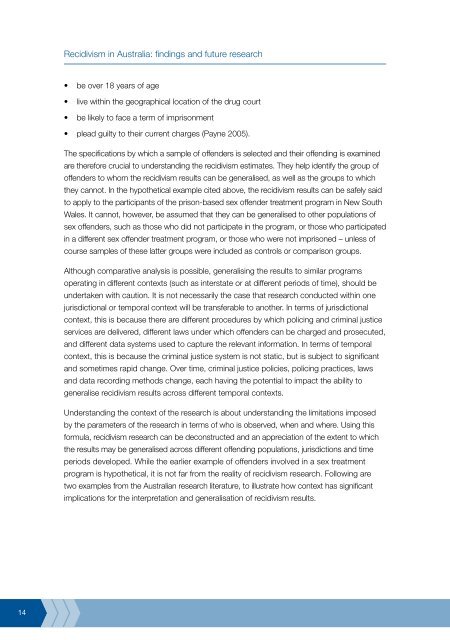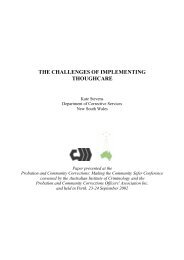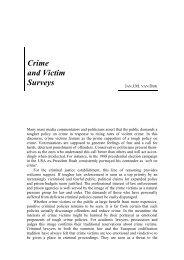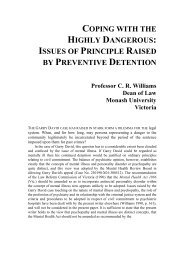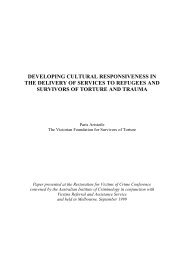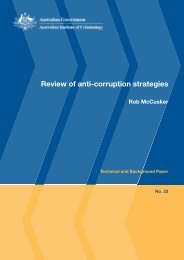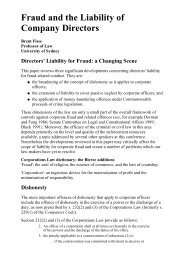Recidivism in Australia : findings and future research - Australian ...
Recidivism in Australia : findings and future research - Australian ...
Recidivism in Australia : findings and future research - Australian ...
Create successful ePaper yourself
Turn your PDF publications into a flip-book with our unique Google optimized e-Paper software.
14<br />
<strong>Recidivism</strong> <strong>in</strong> <strong>Australia</strong>: f<strong>in</strong>d<strong>in</strong>gs <strong>and</strong> <strong>future</strong> <strong>research</strong><br />
•<br />
•<br />
•<br />
•<br />
be over 18 years of age<br />
live with<strong>in</strong> the geographical location of the drug court<br />
be likely to face a term of imprisonment<br />
plead guilty to their current charges (Payne 2005).<br />
The specifications by which a sample of offenders is selected <strong>and</strong> their offend<strong>in</strong>g is exam<strong>in</strong>ed<br />
are therefore crucial to underst<strong>and</strong><strong>in</strong>g the recidivism estimates. They help identify the group of<br />
offenders to whom the recidivism results can be generalised, as well as the groups to which<br />
they cannot. In the hypothetical example cited above, the recidivism results can be safely said<br />
to apply to the participants of the prison-based sex offender treatment program <strong>in</strong> New South<br />
Wales. It cannot, however, be assumed that they can be generalised to other populations of<br />
sex offenders, such as those who did not participate <strong>in</strong> the program, or those who participated<br />
<strong>in</strong> a different sex offender treatment program, or those who were not imprisoned – unless of<br />
course samples of these latter groups were <strong>in</strong>cluded as controls or comparison groups.<br />
Although comparative analysis is possible, generalis<strong>in</strong>g the results to similar programs<br />
operat<strong>in</strong>g <strong>in</strong> different contexts (such as <strong>in</strong>terstate or at different periods of time), should be<br />
undertaken with caution. It is not necessarily the case that <strong>research</strong> conducted with<strong>in</strong> one<br />
jurisdictional or temporal context will be transferable to another. In terms of jurisdictional<br />
context, this is because there are different procedures by which polic<strong>in</strong>g <strong>and</strong> crim<strong>in</strong>al justice<br />
services are delivered, different laws under which offenders can be charged <strong>and</strong> prosecuted,<br />
<strong>and</strong> different data systems used to capture the relevant <strong>in</strong>formation. In terms of temporal<br />
context, this is because the crim<strong>in</strong>al justice system is not static, but is subject to significant<br />
<strong>and</strong> sometimes rapid change. Over time, crim<strong>in</strong>al justice policies, polic<strong>in</strong>g practices, laws<br />
<strong>and</strong> data record<strong>in</strong>g methods change, each hav<strong>in</strong>g the potential to impact the ability to<br />
generalise recidivism results across different temporal contexts.<br />
Underst<strong>and</strong><strong>in</strong>g the context of the <strong>research</strong> is about underst<strong>and</strong><strong>in</strong>g the limitations imposed<br />
by the parameters of the <strong>research</strong> <strong>in</strong> terms of who is observed, when <strong>and</strong> where. Us<strong>in</strong>g this<br />
formula, recidivism <strong>research</strong> can be deconstructed <strong>and</strong> an appreciation of the extent to which<br />
the results may be generalised across different offend<strong>in</strong>g populations, jurisdictions <strong>and</strong> time<br />
periods developed. While the earlier example of offenders <strong>in</strong>volved <strong>in</strong> a sex treatment<br />
program is hypothetical, it is not far from the reality of recidivism <strong>research</strong>. Follow<strong>in</strong>g are<br />
two examples from the <strong>Australia</strong>n <strong>research</strong> literature, to illustrate how context has significant<br />
implications for the <strong>in</strong>terpretation <strong>and</strong> generalisation of recidivism results.


